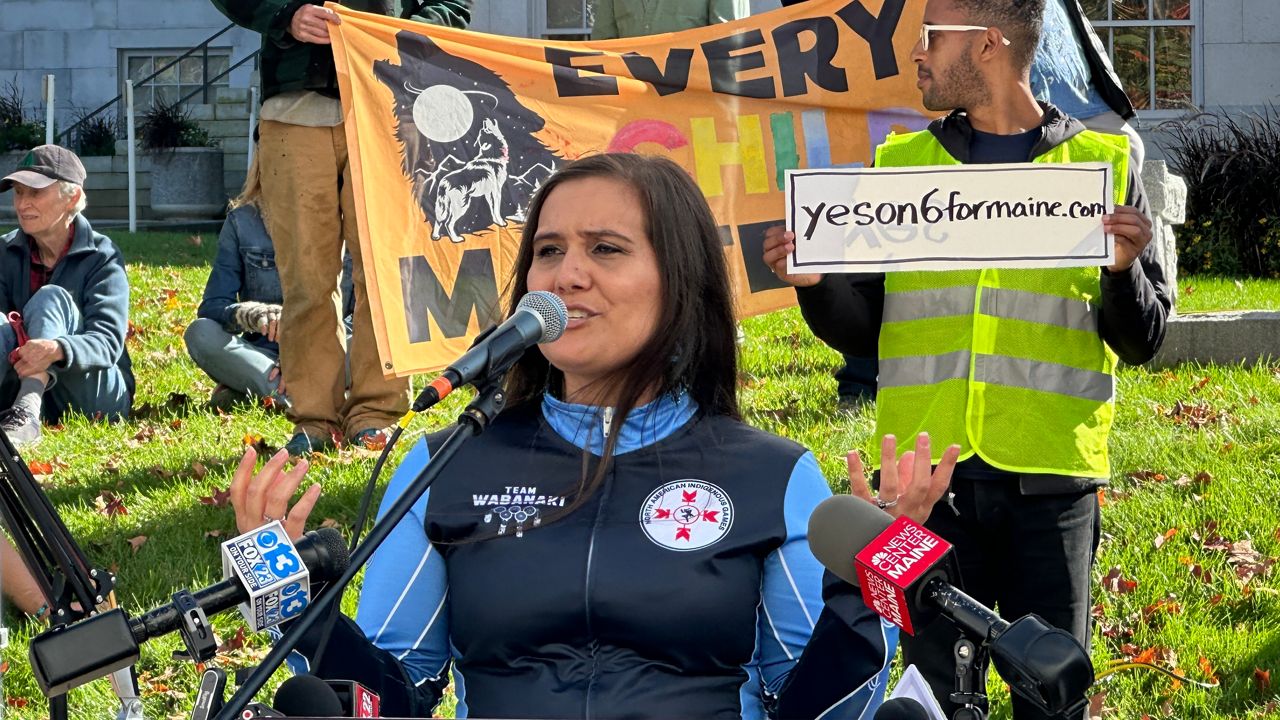Question 6 on the November ballot proposes to add language back to printed copies of the state constitution that outlines Maine’s original obligations to the Wabanaki tribes.
Supporters say it’s another way to acknowledge the relationship between the tribes and the state. But opponents, including an attorney for Gov. Janet Mills, say it could be confusing to add back in language that is no longer relevant because of a 1980 agreement.
For Penobscot Nation Ambassador Maulian Bryant, it’s more than a symbolic gesture.
“They have been removed from the printed history and we want to put them back,” Bryant said during a rally on Indigenous Peoples’ Day at the State House. “It really is that simple. There’s no hidden agenda. There’s no secrets here. It’s just about transparency, truth and restoration of our history.”
The language, along with several other parts of the constitution, was removed from printed copies in 1876, when the document was recodified to make it easier to read.
A 2021 analysis of the removal of the language that refers to the tribes concluded that it was likely “clerical in nature.”
Printed copies of the constitution now say “Original sections 1, 2, 5 of Article X not to be printed; section 5 in full force.” Section 5 is the part that delineates Maine’s obligation to honor “all duties and obligations…towards the Indians” as part of its separation from Massachusetts in 1820.
The question that will appear on the Nov. 7 ballot refers to printing all of the provisions and does not single out the one with regard to tribal rights.
It reads: “Do you favor amending the Constitution of Maine to require that all of the provisions of the Constitution be included in the official printed copies of the Constitution prepared by the Secretary of State?”
The bill to put the constitutional amendment out to voters gained strong bipartisan support in the Legislature. The ballot question is one of eight voters will consider next month.
In recent years, the tribes have made gains in Maine, most notably winning the right to run mobile sports wagering, which is projected to grow into a multi-million industry.
But they’ve been stymied in their efforts to gain full sovereignty, something that will be revisited by lawmakers next year.
And they came within just a few votes of getting access to a broader array of federal benefits, but the House failed to override a veto from Mills.
Tribal leaders have been invited to meet with Mills in November to lay the groundwork for future negotiations. The Passamaquoddy at Sipayik were scheduled to pick a new leader this week following a vote to recall Chief Rena Newell.
When it comes to Question 6, Mills’ chief legal counsel Gerald Reid told lawmakers earlier this year that the Maine Indian Land Claims Settlement of 1980 is what defines the relationship between the state and tribes, not treaties referenced in the constitution that date back to the 1800s.
“It is foreseeable that some will wrongly believe that once again including the Articles of Separation in printed copies of the Constitution revitalizes 18th and 19th century treaty obligations,” he said. “That is incorrect.”
He said Mills has worked with the tribes to protect sustenance fishing, help tribal courts prosecute domestic violence offenders, provide tax relief to tribal members and protect drinking water.
“Because this legislation would not solve any real-world problem, but would instead create new confusion, the Office of the Governor urges that you vote ought-not-to-pass,” he told the Legislature’s Judiciary Committee.
Bryant said she hopes Mainers vote to add the language back to the printed copies and sees it as another step toward winning full sovereignty.
“For the Wabanaki people, this is important to us,” she said. “This is significant for us that at least the language can be viewed and we can begin the conversation.”



